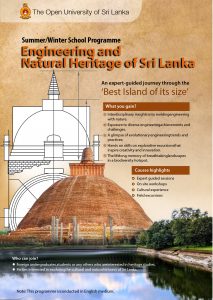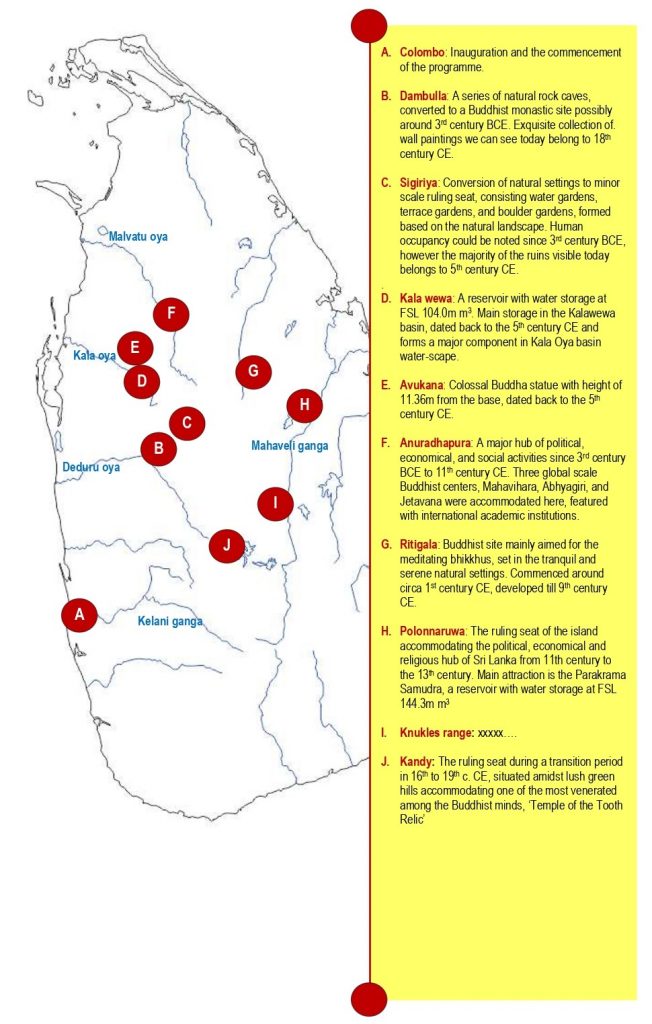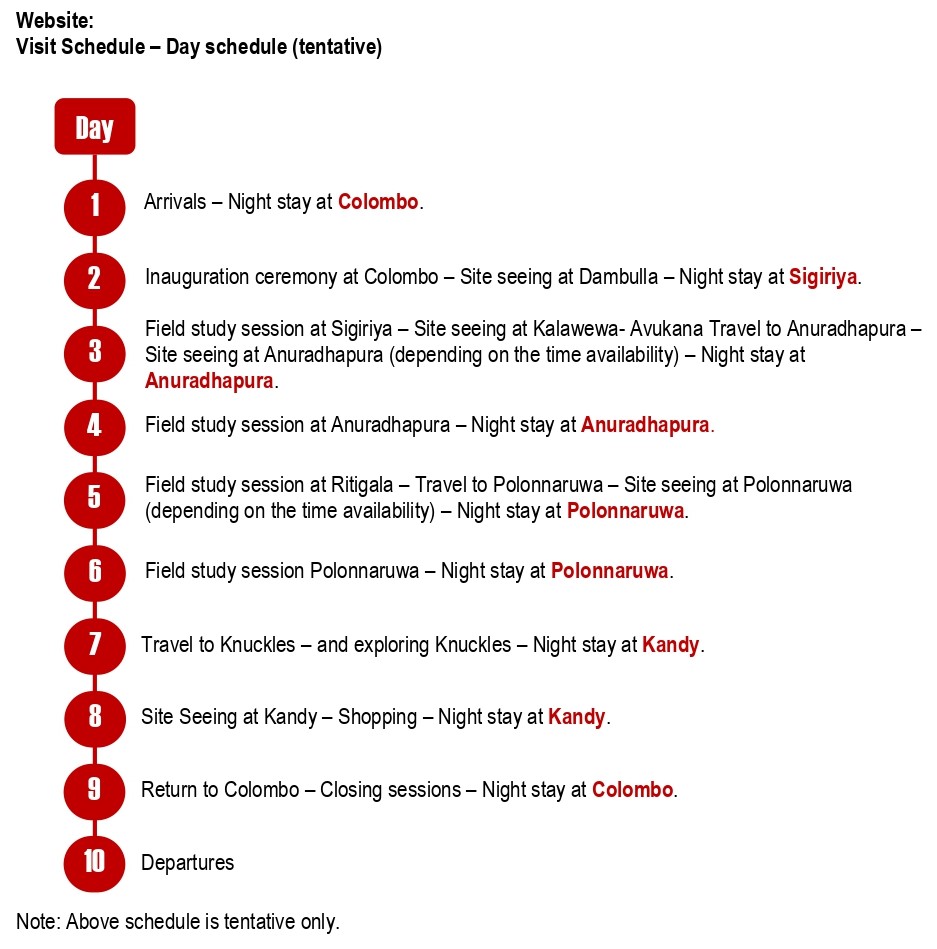This programme is designed:
– To explore the salient features of Sri Lanka’s engineering heritage, with a special focus on its sustainability platform.
– To expose to the rich and diverse bio-diversity of Sri Lanka, with the distributed patterns in the climatic and topographic zones.
– To acknowledge the current trends in the localized indigenous knowledge assimilation initiatives on environmental sustainability and resource management strategies.
To highlight the importance of Sri Lanka in early knowledge transfer networks, with its strategic location in the contemporary maritime routes.
Course Objective
Once you complete this programme, you should be able to achieve the following knowledge and skills.
- ▪️Interdisciplinary insights into melding engineering with nature
- ▪️Exposure to diverse engineering achievements and challenges
- ▪️A glimpse of evolutionary trends in engineering principles and practices
- ▪️Hands-on skills on explorative excursions that inspire creativity and innovation.
- ▪️The lifelong memory of a breathtaking landscapes in a biodiversity hotspot
Participants
This programme aims for:
- ▪️Foreign undergraduates, students, or any others who are interested in heritage studies.
- ▪️Parties interested in exploring the cultural and natural richness of Sri Lanka.
Medium of Instructions
The prgramme is conducted and all the study materials are available in English medium. Therefore, a fair knowledge in the English language is preferred.
Course Highlights
Module 1: Historical & Natural Settings
- ▪️Introduction
- ▪️Natural settings
- ▪️Location
- ▪️Topographic & climatic zones
- ▪️Historical settings
- ▪️Pre-historic to late-historic periods
- ▪️Colonial occupation
- ▪️Post-colonial period
Module 2: Engineering Heritage in general
- ▪️Introduction
- ▪️Natural conditions
- ▪️Demographic conditions
- ▪️Socio – cultural transformations
- ▪️Necessity of Engineering products
- ▪️Nature – Human – Engineering matrix
Module 3: Construction and Structures
- ▪️Introduction
- ▪️Stūpa structures
- ▪️Walled structures
- ▪️Column & Beam structures
- ▪️Dome structures
- ▪️Natural caves and modifications
- ▪️Building Thermal Comfort
- ▪️Sustainable framework of the constructions & structures
Module 4: Water Utilization
- ▪️Introduction
- ▪️Water storages
- ▪️Water diversion sites
- ▪️Inter-basin water diversions and canal systems
- ▪️Village tanks cascades
- ▪️Water & urban settings
- ▪️Sustainable framework of the constructions & structures
Module 5: Transport & Mobility
- ▪️Introduction
- ▪️Maritime transport
- ▪️Ports, artifacts & currency
- ▪️Traditional sea crafts
- ▪️Inland water transport
- ▪️Traditional crafts for inland water transport
- ▪️Inland land transport
- ▪️Road networks & bridges
- ▪️Resting places and facilities
Module 6: Metals & Processing
- ▪️Introduction
- ▪️Iron extraction & processing
- ▪️Steel manufacturing
- ▪️Steel implements
- ▪️Copper extraction & processing
- ▪️Other metals (gold, etc.) extraction & processing
- ▪️Products and markets
Module 7: Urban settings & Cities
- ▪️Introduction
- ▪️Formation of cities
- ▪️Monastic sites as densely populated areas
- ▪️Water supplies
- ▪️Meals supply & refractory
- ▪️Healthcare & hygiene
- ▪️Waste disposal
- ▪️Organic architecture and garden complexes
Module 8: Ecosystems in Sri Lanka
- ▪️Introduction
- ▪️Tropical throne forests
- ▪️Tropical dry monsoon forests
- ▪️Tropical moist monsoon forests
- ▪️Tropical wet lowland evergreen forests
- ▪️Riverine dry forests
- ▪️Tropical montane forests
|
Programme Code :
|
|
|
Programme Category :
|
|
|
Approved by :
|
|
|
Conducted by :
|
The Center for Environmental Studies and Sustainable Development (CESSD)
|
|
Programme duration :
|
10 Days
|
|
Application open date:
|
05th April 2024
|
|
Application closing date :
|
05nd May 2024 |
|
Commencing date:
|
|
Course fee for a student will be USD 1500
This Short Course is conducted by the Center for Environmental Studies and Sustainable Development
For more details contact the academic coordinator, <to be updated>.
|
Address :
|
Coordinator , The Center for Environmental Studies and Sustainable Development,
The Open University of Sri Lanka, P.O.Box 21, Nawala, Nugegoda.
|
|
Contact :
|
0112881423
|
|
Email :
|
cessd@ou.ac.lk |
Last Updated on 10 months




